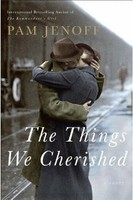"The Things We Cherished" spans decades

In The Things We Cherished (Doubleday, 2011), a new book by Rutgers–Camden law professor Pam Jenoff, the author provides a unique look at the lives touched by a century-old anniversary clock in rich historical detail.
“My husband gave me a beautiful antique clock for our wedding anniversary, called an anniversary clock, or a 400-day clock because it only needs to be wound once a year,” Jenoff says of her inspiration for her new novel. “I found myself wondering about the places it had been and the things it had ‘seen.’”
In the book, the history of the old timepiece may help a Philadelphia lawyer prove the innocence of a wealthy financier accused of World War II-era war crimes.
“I took great liberties in fictionalizing the history of this type of clock, putting the emphasis on its development in Europe rather than America in order to use it as a metaphor for the 20th century European Jewish experience by showing the lives it had touched,” Jenoff explains.
Jenoff, a Cherry Hill resident, is the author of several other works of fiction, including The Kommandant’s Girl, The Diplomat’s Wife, Almost Home, and A Hidden Affair. She says her latest book is both a departure from her other works and a homecoming.
“It marks new territory for me because all of my other books were either historical or modern and The Things We Cherished contains elements of both,” says the Rutgers–Camden law professor. “It is also different in that my prior books were all told from a single point of view, in first person and in the present tense, whereas this book jumps to various narrators at differe

Just as she does in her other books, Jenoff draws on personal and professional experience to help shape her story. She worked as a Foreign Service Officer with the State Department in Krakow, Poland, specializing in Polish-Jewish relations and Holocaust issues while becoming “very close to the surviving Jewish community there.”
“This novel is a tribute to the people and places that so inspired me,” Jenoff says.
Jenoff also practiced law in Philadelphia, just like the book’s protagonist.
“It is very much a return to my roots, writing about the Holocaust, and I think this book will resonate with readers who enjoyed my first book, The Kommandant's Girl,” she says.
Jenoff says her legal writing has helped her hone her fiction writing. This summer, she is tying the two skills together with the help of a $5,000 research grant from the Association of Legal Writing Directors.
The grant is allowing Jenoff to research and write her article, “Novel Ideas: Importing Fiction Writing Process and Techniques to Enhance Legal Writing,” which explores what novelists do to jumpstart, shape, and revise their work and how those ideas can be applied to legal writing.
“I think we continually evolve and learn about ourselves as writers, our strengths and our weaknesses and the things that motivate us to write,” she says. “I'm not sure it gets any easier but hopefully the work deepens and that's a message I try to share with my legal writing students.”
Jenoff is a clinical assistant professor at the Rutgers School of Law–Camden. She received her undergraduate degree from George Washington University, her master’s degree from Cambridge University, and graduated from the University of Pennsylvania Law School. She teaches “Legal Analysis, Writing, and Research” and “Employment Discrimination” at Rutgers–Camden.
-30-
Media Contact: Ed Moorhouse
(856) 225-6759
E-mail: ejmoor@camden.rutgers.edu